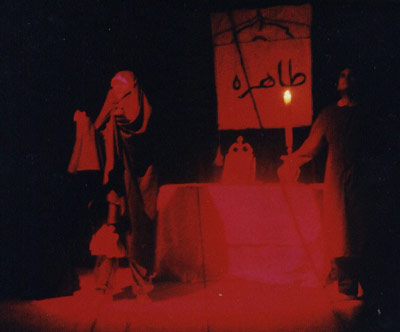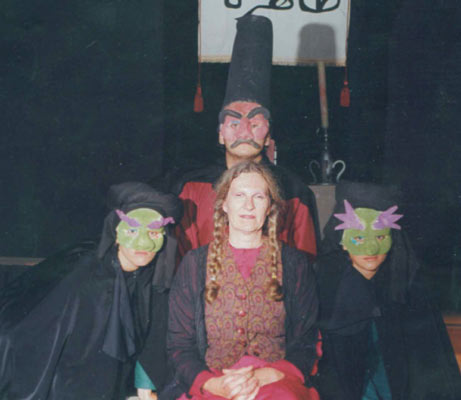BAFA © 2010. All material here is copyrighted. See conditions above. |
Suellen W. Dornbrook
playwright, Argentina
|
 Táhirih by Suellen W. Dornbrook, performed at the Mascara Theatre in Resistencia, Chaco, Argentina in 1998. The word in Persian is "Táhirih".
|
"Táhirih", a fifty minute play written in Spanish by Suellen W. Dornbrook and directed by Gladis Gómez, Argentina was premiered at the Mascara Theatre in Resistencia, Chaco, Argentina in 1998.
A first play on a Bahá´í theme for both, it was dedicated to the Iranian Bahá´í professors imprisioned in 1998 for giving classes to the Bahá´í students denied their university education because of their religion.
The Universal House of Justice was deeply moved by this gesture of solidarity. One of the actors Cesar Ayala composed a beautiful song dedicated to Tahirih entitled "Mother Courage". |
This play was also performed in the Guido Miranda State Theatre, at the 1998 International Women´s Conference in Rosario, Argentina. In the play the actors wore masks, handcrafted to fit each actor's face. "Chadors" or street veils were handed out at the theatre entrance by young women themselves attired in chadors to all women attending the play with instructions to put them on when called upon to do so.
A woman in the audience, stands up. She asks herself what it is that makes one a heroine. Absorbed in thought she walks up to the stage giving various examples of outstanding heroines then exits, leaving the audience wondering. There is an altar like table at mid stage with a tapestry bearing the word "Tahirih" in Persian script. Suddenly two women and a man start making a ruckus among the theatre goers, accusing one another. "You womanizer!" "You - you never stay home with the kids!" "What! You spend all your time on the phone!" Continuing to argue they come out of the audience up onto the stage and proceed to the altar with their backs to the public while they don their masks and black capes. They then turn and go to the prosenium and with a loud voice direct themselves to the audience, "Women, put on your veils!"
After more disparaging remarks they pull a cord, and a fine semi-transparent screen drops down and veils the fourth bla ck wall of the stage. The woman reappears from behind the tapestry clothed in a long dark dress and kerchief. The three personages of the chorus seize her and force her to be covered with a "chador". They throw her to the floor where she is abandoned in a shaft of green light. Reciting words of Tahirih she struggles to arise.
Thus begins the telling of the story of Tahirih as seen respectively through the eyes of her mother, her sister, her maid servant, and finally her own self. As the story unfolds she is challenged and badgered constantly by the masked figures of the opposition.
Defying them all she rends the veil between herself and the audience. The chorus counters rapidly, twisting her white veil about her neck and bringing her life to an end.
|
 Some actors in the play Tahirih with the playwright, Suellen W. Dornbrook
(seated in the centre) at the Mascara Theatre in Resistencia, Chaco,
Argentina in 1998.
|
Suellen W. Dornbrook, born in Pennsylvania, USA, in 1950, has lived in the Chaco region of northern Argentina for more than 30 years. Although she has a master´s degree in educational policy, her formal theatre training began in 1996 at the Máscara Theatre in the Chaco. This was followed by a series of intensive courses with recognized Argentine theatre masters in stage direction, acting, lighting and dramaturgy. |
The Cuban director Victor Varela, founder of the "Teatro del Obstáculo", was her mentor for four years and has exercised the greatest influence on her theatre. She is currently using theatre arts in support of her activities with the Children and Youth Ambassdaors for Peace Foundation in response to UNESCO´s call for a decade of the Culture of Peace and Non-Violence for the Children. Suellen Dornbrook has written and produced five plays, is a member of the Argentine playwrights association Arg entores, and is presently engaged in writing a play about May Bolles Maxwell, an early Canadian Bahá´í, whose tomb is located in Argentina.
She is the founder and director of 2 theatre groups. "Arete" which presented Lysistrata in 2002. The State Secretary of Culture has invited "Arete" to perform as part of their International Lysistrata Project. The second is the "Tatec Lamaiq" (Sweetness without end) theatre group which won honorable mention in a regional theatre festival in 2002. They are hoping to tour the Kom communities in the interior of the province. Their play "Postales de Tatec Lamaiq" was based on interwoven scenes from 3 of her former plays of myths and everyday life combining modern cumbia music and ancient songs and dances of the Kom. In the words of one of the members their mission is to "help nurture this little sprout of our dried up roots".
Suellen W. Dornbrook can be contacted at suedor@eudoramail.com |
- Illustration and caption: Just Let the Wind, 2006
|

Arts Dialogue, Dintel 20, NL 7333 MC, Apeldoorn, The Netherlands
email: bafa@bahai-library.com
|
|

